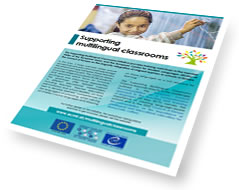Introduction
This training and consultancy activity helps member states of the European Union and the European Centre for Modern Languages (ECML) of the Council of Europe ensure access to quality education and helps bridge the attainment gap between these learners and non-migrant pupils. The initiative draws on a wide range of successful ECML projects and resources which focus on inclusive, plurilingual and intercultural approaches. The workshops offer tailored support to different educational stakeholders, including teachers, teacher educators, administrators and school leaders, on how best to develop learners’ competences in the language/s of schooling, whilst valuing all children’s home languages and drawing on these languages as a rich resource for learning.
Target groups
The workshops will offer support on how to value children’s home languages as well as on how to draw on these languages as a rich resource for learning.
These workshops will be offered to:
- Language teachers
- Other subject teachers
- Teacher educators
- School administrators
- School leaders
Objectives
The long-term objective of the initiative is that learners with a migrant background are better integrated into national education systems, leading to better educational achievement, which in turn will contribute to improved self-esteem, better employment prospects and a more cohesive society.
As part of the initiative, a series of national workshops in participating states are offered to address such issues as:
- whole-school policies and strategies to support the integration of migrant learners
- holistic approaches to language learning and teaching including the language of schooling, foreign languages and home languages
- challenges facing non-language teachers and how to adapt pedagogical approaches to meet the needs of migrant learners
Support materials will be developed and adapted, by drawing on key ECML tools and resources, to meet the needs of specific contexts.
Outputs
Training workshops for local and regional multipliers in participating EU and ECML member states offering:
- training modules adapted to meet the different needs of language teachers, other subject teachers, teacher educators, school administrators and school leaders on such topics as how to develop competences in the language/s of schooling, how to value, celebrate and draw on the rich linguistic and cultural heritage that migrant learners bring to the classroom and to the wider school community, as well as the important role of parents and other stakeholders
- a dedicated section on the ECML website outlining key resources for multilingual classrooms.
Flyer
 Download flyer
Download flyer